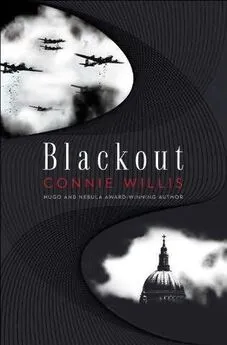Connie Willis - Blackout
- Название:Blackout
- Автор:
- Жанр:
- Издательство:неизвестно
- Год:неизвестен
- ISBN:нет данных
- Рейтинг:
- Избранное:Добавить в избранное
-
Отзывы:
-
Ваша оценка:
Connie Willis - Blackout краткое содержание
In her first novel since 2002, Nebula and Hugo award-winning author Connie Willis returns with a stunning, enormously entertaining novel of time travel, war, and the deeds—great and small—of ordinary people who shape history. In the hands of this acclaimed storyteller, the past and future collide—and the result is at once intriguing, elusive, and frightening.
Oxford in 2060 is a chaotic place. Scores of time-traveling historians are being sent into the past, to destinations including the American Civil War and the attack on the World Trade Center. Michael Davies is prepping to go to Pearl Harbor. Merope Ward is coping with a bunch of bratty 1940 evacuees and trying to talk her thesis adviser, Mr. Dunworthy, into letting her go to VE Day. Polly Churchill’s next assignment will be as a shopgirl in the middle of London’s Blitz. And seventeen-year-old Colin Templer, who has a major crush on Polly, is determined to go to the Crusades so that he can “catch up” to her in age.
But now the time-travel lab is suddenly canceling assignments for no apparent reason and switching around everyone’s schedules. And when Michael, Merope, and Polly finally get to World War II, things just get worse. For there they face air raids, blackouts, unexploded bombs, dive-bombing Stukas, rationing, shrapnel, V-1s, and two of the most incorrigible children in all of history—to say nothing of a growing feeling that not only their assignments but the war and history itself are spiraling out of control.
Blackout - читать онлайн бесплатно полную версию (весь текст целиком)
Интервал:
Закладка:
Was there a shelter at the bottom? Or waiting accomplices? There was no shelter symbol on the wall next to the stairs.
There was a second explosion. She turned to face him, hoping it would illuminate the street behind him-and a path of escape. It did. It also illuminated the white letters on his tin hat.
An ARP warden. And seventy-five if he was a day. “Down there,” he ordered her again, pointing down the now-invisible stairs. “Quick.”
Polly obeyed, groping for the railing and feeling her way down the narrow, steep steps. There was another explosion, too close, but no corresponding light, and by the time she was halfway down she couldn’t see anything. She glanced back up the steps, but it was just as dark up there. She couldn’t even tell if the warden was still standing there to make certain she’d obeyed, or if he’d gone off to waylay someone else and drag him to a shelter.
If that was what was at the foot of these stairs. If there even was a foot-the steps seemed to go on and on. She worked her way down them, feeling for the edge of each one with her foot. After an eternity, she reached solid pavement and patted her way to a door. It was wooden, with an old-fashioned iron latch. She tried to open it, but it seemed to be locked. She knocked.
No response.
They didn’t hear me, she thought and knocked again, harder.
Still no answer.
What if the warden got disoriented in the darkness and brought me to the wrong place? What if this is an alley, and this is a side door in a warehouse? she thought, remembering the cobwebbed black door in the drop. What if there’s no one on the other side?
There was another explosion. I can’t stay here, she thought, and began to grope her way back over to the stairs. A bomb hit nearly at the head of the stairs, and then two more, in rapid succession.
She turned back to the door. “Let me in!” she called, pounding on the door with both fists, and then, when there was still no answer, taking off a shoe and pounding on the door with it, trying to make herself heard over the din of the raid.
The door opened. The sudden brightness from inside blinded her, and she put up her hand, still holding her shoe, to shield her eyes, and stood there squinting at the tableau inside. People sat against the walls on blankets and rugs, and a dog lay at the feet of one of the men. Three older women sat side by side on a high-backed bench, the middle one knitting-or rather, she had been knitting. Now she, like all the others, was staring at the door and at Polly. An aristocratic-looking elderly gentleman in the far corner had lowered the letter he was reading to look at her, and three fair-haired little girls had stopped in the middle of a game of Snakes and Ladders to stare at her.
There was no expression on any of their faces, no welcoming smiles-even from the man who’d let her in. No one moved or made a sound. They were frozen, as if they’d suddenly stopped in midsentence, and there was a feeling of fear, of danger in the room.
The thought flashed through her mind, This isn’t a shelter. The man who brought me here wasn’t a real warden. He could have stolen that ARP helmet, and these people are only pretending to be shelterers. But that was ridiculous. The man who’d let her in was obviously a clergyman. He was wearing a clerical collar and spectacles, and this wasn’t Dickens’s London. It was 1940.
It’s me. There must be something wrong with the way I look, she thought, and realized she was still holding her shoe in her hand. She bent to slip it on, then looked back up at the assembly, and what she’d seen before must have been a trick of the light or her overactive imagination because now the scene looked perfectly normal. The white-haired woman smiled pleasantly at her and took up her knitting; the aristocratic gentleman folded his letter, returned it to its envelope, and put it in his inside coat pocket; the little girls returned to their game; and the dog lay down and put its head on its paws.
“Do come in,” the clergyman said, smiling.
“Shut the door,” a woman shouted, and someone else said, “The blackout-”
“Oh,” Polly said, “sorry,” and turned to shut the door.
“You’ll get us all fined,” a stout man said grumpily.
Polly pushed the door shut, and the clergyman barred it, but apparently not fast enough. “What are you trying to do?” a scrawny woman with a sour expression demanded. “Show the jerries where we are?”
And so much for the fabled cheerful camaraderie of the Blitz, Polly thought. “Sorry,” she said again, looking around the shelter for a place to sit. There was no furniture except for the bench. Everyone else sat on the stone floor or on blankets, and the only vacant spot was between the stout man who’d growled at her to shut the door and two young women in sequin-adorned dresses and bright red lipstick, who were busily gossiping. “I beg your pardon, may I sit here?” she asked them.
The man looked annoyed, but grunted assent, and the young women nodded, scooted closer together, and went on chatting. “… and then he asked me to meet him at Piccadilly Circus and go dancing with him!”
“Oh, Lila, he didn’t!” her friend said. “You’re not going to, are you?”
“No, of course not, Viv. He’s far too old. He’s thirty.”
Polly thought of Colin and suppressed a smile.
“I told him, you need to find someone your own age.”
“Oh, Lila, you didn’t,” Viv said.
“I did. I wouldn’t have gone out with him at any rate. I only go out with men in uniform.”
Polly took off her coat, spread it out, sat down on it, and looked around at the room. It was obviously one of the shop or warehouse cellars pressed into service as a shelter when the Blitz began, though it didn’t look as makeshift as she’d expected, considering the Blitz had begun only three days ago. Its contents, except for the high-backed bench, had been pushed to the far end, and the ceiling had been braced with heavy lengths of lumber. A stirrup pump, a bucket of water, and an axe stood on one side of the door. On the other was a table holding a gas ring and a kettle, cups and saucers, and spoons.
The shelterers’ arrangements didn’t look makeshift either. The knitter had brought her yarn, a shawl, and her reading glasses with her; the table was covered with an embroidered tea cloth; and the three little girls-whom Polly estimated as being three, four, and five-had not only their board game, but several dolls, a teddy bear, and a large book of fairy tales, which they were clamoring to have their mother read to them. “Read us ‘Sleeping Beauty,’” the eldest one said.
“No,” the littlest one piped up. “The one with the clock.”
The clock? Polly wondered. Which one is that?
And apparently her sisters didn’t know either. “What’s the clock story?” the eldest one asked.
“‘Cinderella,’” the littlest one said as if it were self-evident.
The middle girl took her thumb out of her mouth. “That’s the one with the shoe,” she said, and pointed at Polly.
And Polly supposed she had looked a bit like Cinderella, standing there in one shoe. And, just like Cinderella, she’d failed to ascertain her space-time location, with nearly as disastrous results. Except that no one had been dropping bombs on Cinderella.
And Badri had said there might be two hours of slippage, not twelve. The morning of the tenth must have been a divergence point for there to have been so much slippage. Or perhaps, in spite of its deserted appearance, someone had been in the alley or in a position where they could see the shimmer and kept it from opening. Whichever it was, she’d lost a full day of her already too short assignment.
She looked around at the others. The middle-aged woman sitting next to the knitter was the image of an early twentieth-century spinster, with her laced brown shoes and her graying hair pulled back into a bun and held in place with tortoiseshell combs. They could all have been taken from one of Merope’s murder mysteries-the frail, white-haired old woman, the clergyman, the sour-faced, sharp-tongued woman, the gruff stout man who looked as if he might have been in the military. Colonel Mustard in the air-raid shelter with the service revolver. Perhaps that was why they’d struck her as sinister when she first saw them.
Or perhaps it was their calm self-possession. These were the fabled Londoners, of course, who’d faced the Blitz with legendary courage and humor, who hadn’t even been fazed by the V-1 and V-2 attacks. But they’d had four and a half years of being accustomed to bombing before the rocket attacks. This was only the fourth night of the Blitz, and all the research she’d done had said they’d been terrified all that first week, especially till the anti-aircraft guns had started up on the eleventh, and that they’d only gradually learned to master their fear of the bombs.
But no one was saying, “Where are our guns?” or “Why aren’t we hitting back?” and looking nervously up at the ceiling. They weren’t paying any attention to the thud and crump of the bombs at all. It had apparently only taken the three previous nights for them to completely adapt to the raids. The white-haired woman glanced up, annoyed, at a particularly loud bang, then began counting stitches, and the clergyman returned to discussing next Sunday’s service with a formidable-looking woman with iron-gray hair.
The scrawny, sour-faced woman was still scowling, but Polly had a feeling that was her permanent expression. The aristocratic gentleman was reading the London Times, and the dog had gone to sleep. If not for the occasional muffled explosion overhead and Lila’s talk of dating men in uniform, there’d have been nothing to indicate there was a war on.
And there was nothing to indicate where this was. Since there’d been temporal slippage and the net had sent her through twelve hours later than the target time, it was unlikely there’d been locational slippage as well. There was generally only one or the other. But the bombs were falling too close for this to be Kensington or Marylebone. Polly looked around at the shelter walls for the name or address of the shelter, but the only thing posted was a list of what to do in case of a poison gas attack.
She debated saying she’d got lost in the fog and asking where she was, but given the odd way they’d looked at her when she came in, she decided to listen to their conversations instead and hope they’d let fall some clue, though Lila’s mention of meeting someone hadn’t been any help. She could take the tube to Piccadilly Circus from anywhere, including the East End. And now she was explaining why she only dated soldiers-“It’s my way of doing my bit for the war effort”-and the women on the bench were discussing knitting patterns.
Polly focused on the clergyman, hoping he or the formidable-looking woman-whom he addressed as Mrs. Wyvern-would mention the name of his church, but they were discussing flower arrangements. “I thought lilies might be nice for the altar,” he said.
“No, the altar will be yellow chrysanthemums,” Mrs. Wyvern said, and it was clear who was running things, “and the side chapel bronze dahlias and-”
“Mice!” the littlest girl crowed.
“Yes,” her mother said. “Cinderella’s fairy godmother turned the mice into horses and the pumpkin into a beautiful carriage. ‘You may go to the ball, Cinderella,’ she said. ‘But you must be home by the stroke of midnight.’”
“If that pill of a floorwalker hadn’t made us stay after and do the display windows,” Viv grumbled, “we’d have been able to go to the ball.”
Читать дальшеИнтервал:
Закладка:

![Jane_BlackCat - Понять не поздно... [СИ]](/books/1148838/jane-blackcat-ponyat-ne-pozdno-si.webp)
![Jane_BlackCat - За краем Вечности [СИ]](/books/1148839/jane-blackcat-za-kraem-vechnosti-si.webp)

